The Building and Construction Industry in Numbers
EPS insulation is a key solution
to meet the European energy efficiency's objectives
"Grey" EPS containing graphite
is up to 20% thinner for better insulation performance
EPS embraces the future of the circular economy
through mechanical and chemical recycling
EPS is an extremely lightweight material
tiny EPS beads expand like popcorn
EPS construction waste is collected
across Europe
Insulation is essential
to reduce demand
EPS insulation helps cut emissions
fast and affordably
EPS insulation makes deep renovation possible
and for all, as an affordable solution
EPS insulation supports fast, cost-effective compliance
with EU targets
Targeted renovation is now a legal priority
EPS enables rapid, cost-effective upgrades
EPS contributes to achieving ambitious climate goals in the Building and Construction sector
EUMEPS, with its Smart Insulation Europe initiative, advocates for the invaluable role Expanded Polystyrene (EPS) plays in achieving a more sustainable building stock.
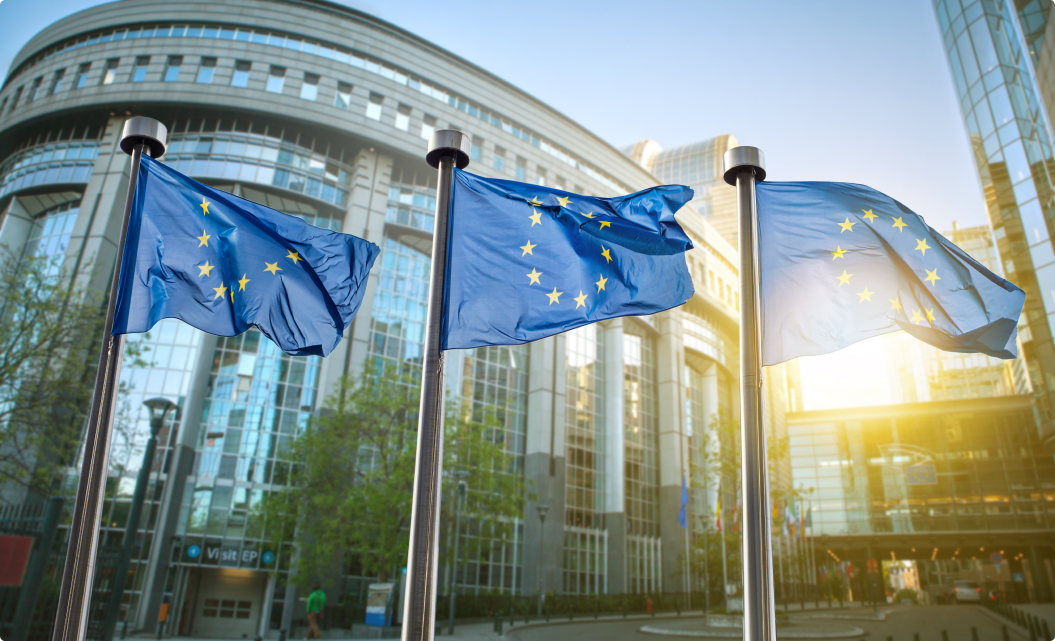

The Voice of the European EPS Industry
Home Insulation
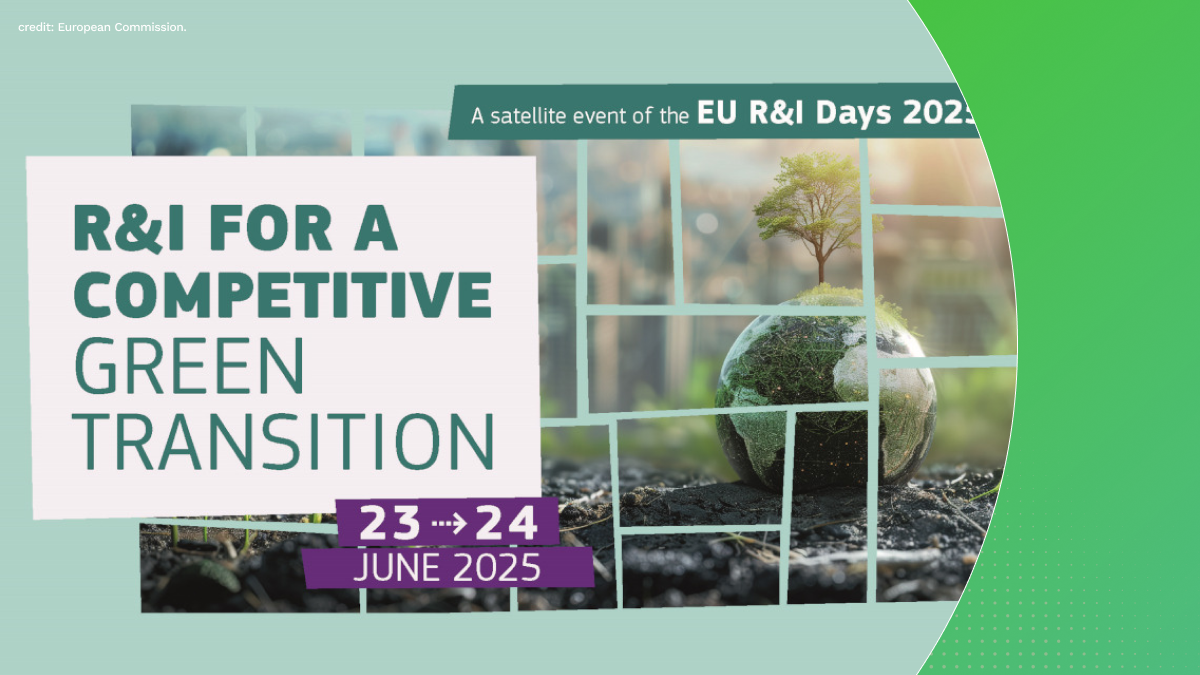
Lea Salihovic Joins EU Dialogue on Green Innovation
- Details
- Written by: Ingrid
- Category: News
- Hits: 57
- Links:
- Link title: The research and innovation community platform, Link URL: https://research-innovation-community.ec.europa.eu/events/5QeKjzL7qwAeiBYCttygi6/overview
On 23 June 2025, Lea Salihovic, EU Policy Manager at EUMEPS, participated in the high-level EU Policy Dialogue on Research and Innovation for a Competitive Green Transition, held in Brussels. As a satellite event of the European Research and Innovation (R&I) Days, the session brought together EU policymakers, researchers, and industry representatives to explore how research and innovation can serve as catalysts for sustainability and industrial competitiveness. The event set the stage for a broader full-day conference the following day and highlighted the strategic role of sectors like expanded polystyrene (EPS) in delivering climate-neutral, circular, and resource-efficient solutions.
Research and Innovation: Core Drivers of the Green Transition
The policy dialogue emphasised the essential role of R&I in achieving the EU’s environmental and economic goals. Discussions highlighted the necessity of creating an ecosystem that nurtures green startups and supports industrial scaleups, particularly in the materials and manufacturing sectors. By focusing on green and blue diplomacy, speakers shared with the audience the importance of aligning EU industrial innovation with global sustainability frameworks and the evolving geopolitical landscape.
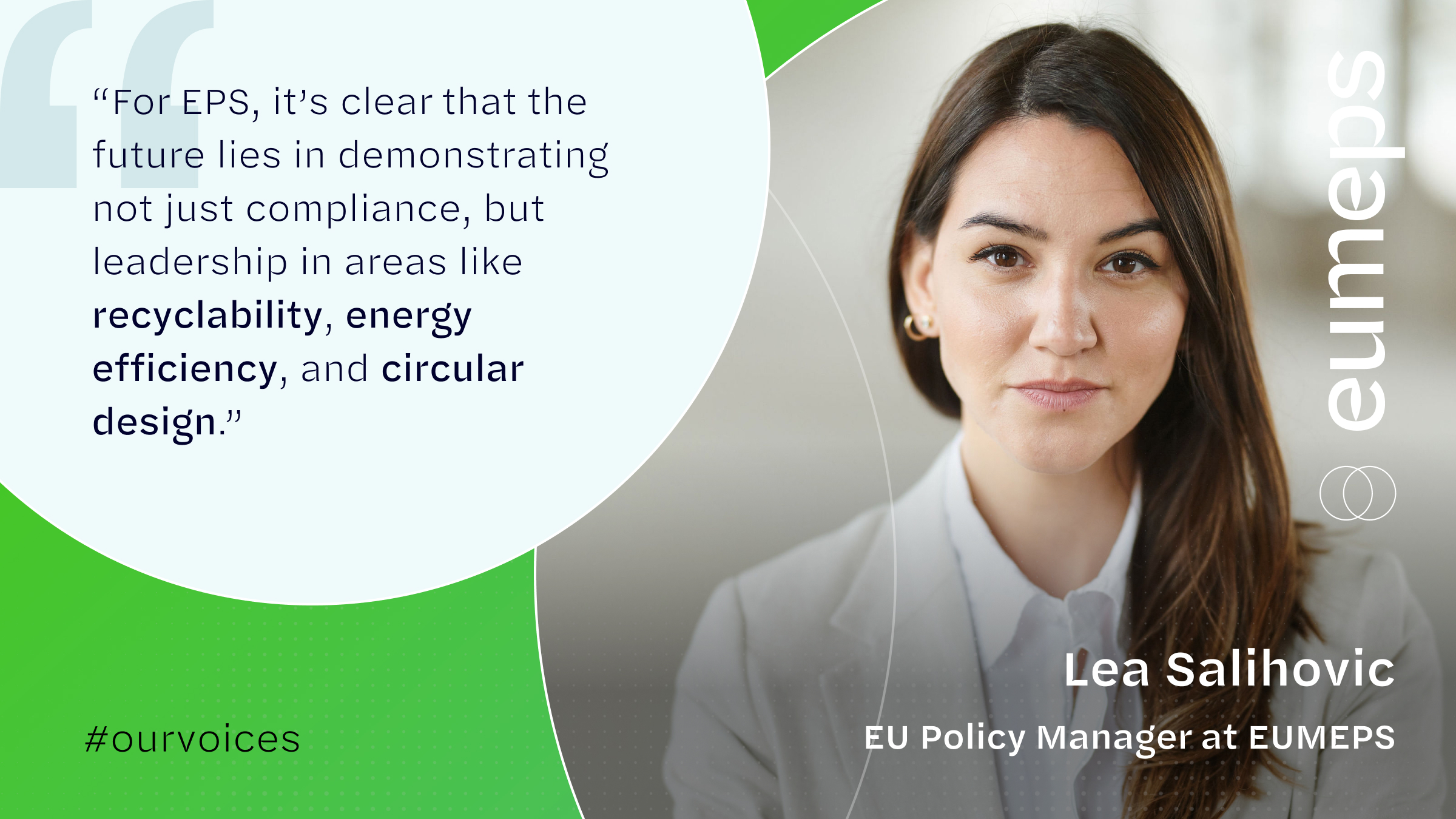
One key issue raised was green disinformation, which undermines public trust and evidence-based policymaking. For industries like EPS that often face scrutiny over environmental impacts, addressing misinformation is critical to ensuring an informed, balanced debate on sustainable solutions.
Reflecting on the event, Lea Salihovic shared:
“The dialogue reaffirmed the importance of aligning industry-driven innovation with EU sustainability goals. For EPS, it’s clear that the future lies in demonstrating not just compliance, but leadership in areas like recyclability, energy efficiency, and circular design. Horizon Europe offers a valuable framework for accelerating this transition.”
Relevance for the EPS Industry
For EUMEPS and the EPS industry more broadly, the dialogue reinforced several strategic directions:
- Circular economy approaches and eco-design are central to making EPS applications in packaging and construction more sustainable.
- EU-funded initiatives, particularly under Horizon Europe, are supporting research in areas such as advanced recycling technologies, low-impact production, and life-cycle assessments.
- There is growing emphasis on public-private collaboration to scale innovations that both reduce carbon emissions and increase material recovery efficiency.
In this context, EPS is well-positioned to contribute to Europe’s climate-neutral ambitions by improving recyclability, optimising manufacturing processes, and enhancing the performance of insulation and packaging applications.
Looking Ahead: From Dialogue to Action
The 23 June dialogue also served as a prelude to the following conference on 24 June, where stakeholders examined R&I success stories and future policy directions. Exhibition showcases included 15 pioneering projects funded by Horizon Europe and Horizon 2020, demonstrating the tangible impact of EU investment in green innovation.
As the EU prepares for its next multiannual financial framework, the outcomes of this policy dialogue signal a stronger alignment between innovation policy and industrial transformation. For EUMEPS, continued engagement in such forums ensures the EPS industry contributes to a greener, more resilient European economy.
Conclusion
The EU Policy Dialogue on Research and Innovation highlighted the pivotal role of collaborative, evidence-based innovation in shaping a competitive and climate-neutral Europe. With its focus on circularity, energy savings, and sustainable materials, the EPS sector is not only affected by these developments but is also a key contributor to the EU’s green industrial transition.

EUMEPS at Interflam 2025: A Useful Exchange on Fire Safety Science
- Details
- Written by: Ingrid
- Category: News - Smart Insulation
- Hits: 44
- Links:
- Link title: Interflam 2025, Link URL: https://www.interflam.co.uk/
From 30 June to 2 July 2025, fire safety specialists from across the world gathered at Royal Holloway, University of London, for the latest edition of Interflam, one of the most respected international conferences on fire science. EUMEPS was represented by Emanuela Gallo, EU Technical Affairs Manager, who attended the three-day event to follow current discussions and engage with the fire safety research community.
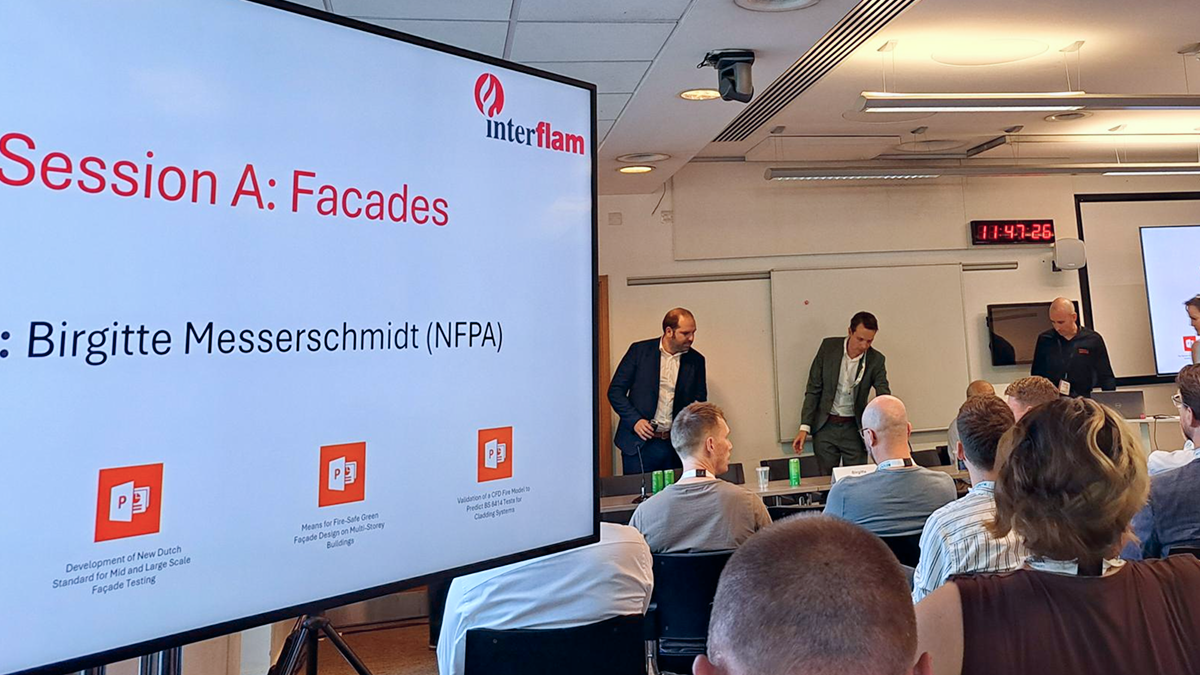 Since its first edition in 1979, Interflam has developed into a key meeting point for researchers, engineers, regulators, and industry. The 2025 programme included three parallel technical sessions, a wide range of poster presentations, and several plenary lectures, covering topics such as material behaviour in fire, new testing methods, modelling, and policy implications.
Since its first edition in 1979, Interflam has developed into a key meeting point for researchers, engineers, regulators, and industry. The 2025 programme included three parallel technical sessions, a wide range of poster presentations, and several plenary lectures, covering topics such as material behaviour in fire, new testing methods, modelling, and policy implications.
Speaking after the event, Emanuela said:
“Interflam was a good opportunity to exchange knowledge, explore different perspectives, and meet experts from across the fire safety community.”
She underlined the high level of technical content and its relevance to EUMEPS’s work:
“The programme was full of well-prepared presentations and research papers. Interflam continues to be a valuable platform for advancing fire safety science.”
In addition to presentations and formal sessions, the event also offered space for informal discussions and peer-to-peer exchanges.
“Having the chance to speak directly with researchers, regulators, and engineers helps build a more practical understanding of where the field is going,” she added. “Thank you to the organisers and participants for a productive and well-run event.”

EUMEPS is a member of the Modern Building Alliance, which also took part in Interflam 2025. The Alliance advocates for a holistic approach to fire safety, based on prevention, detection, early suppression, and safe evacuation. Its presence at Interflam reinforces the shared commitment of the plastics and construction industries to supporting science-based policy and practical solutions.
Fire performance remains a key consideration for all insulation products. EPS, like other construction materials, is subject to strict European requirements under the Construction Products Regulation. EUMEPS works closely with its members and partners to ensure that the performance of EPS is properly reflected in standards and regulatory frameworks, and that innovation in testing and safety continues to be supported.
Attending events such as Interflam allows EUMEPS to stay connected with the latest developments in fire safety research and to contribute constructively to the wider technical conversation shaping the future of safe and sustainable buildings.
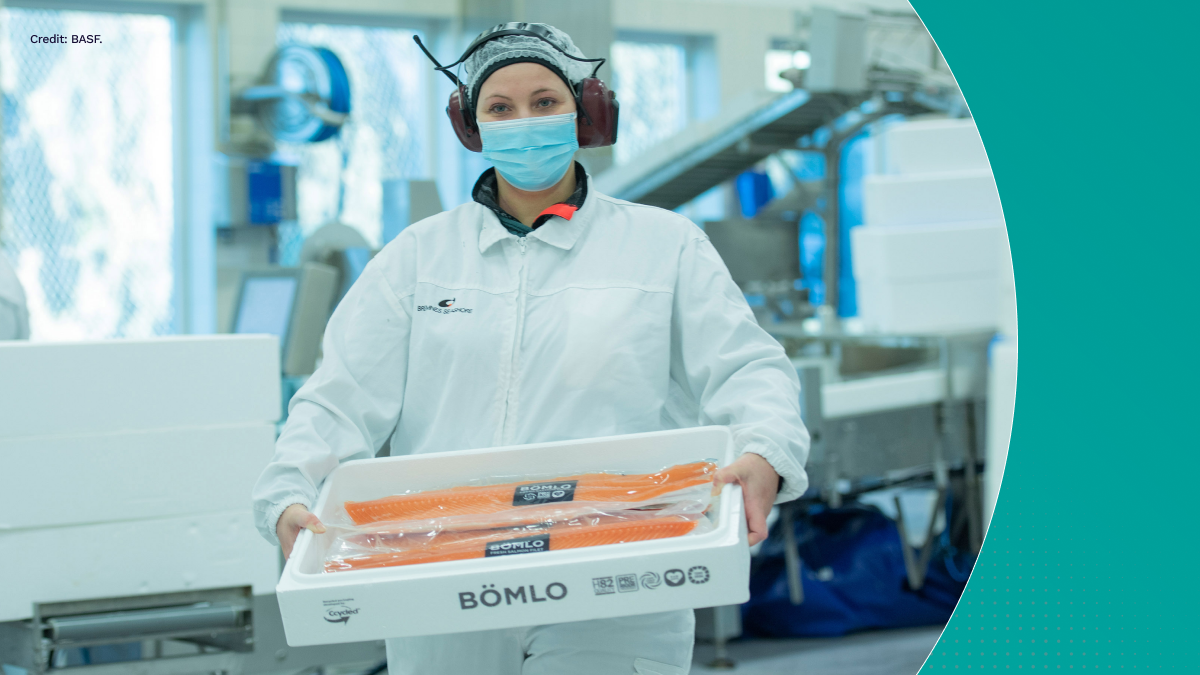
France Lifts Styrenics Ban to Align with EU Packaging Regulation
- Details
- Written by: Ingrid
- Category: News - Smart Packaging
- Hits: 1253
- Links:
- Link title: Read the press release, Link URL: https://eumeps.eu/eumeps-newsroom-packaging/press-releases/article-23-of-the-french-climate-and-resilience-act-on-styrenic-packaging-is-deleted
- Link title: Learn about the Créa-Styr project (in French), Link URL: https://www.elipso.org/projet-crea-styr/
- Link title: Leatn about the CréaStyr project (in English), Link URL: https://www.eumeps.eu/eumeps-newsroom/press-releases/crea-styr-a-conclusive-response-by-industry-players-to-polystyrene-recycling
In a long-awaited move that delivers legal clarity to the packaging sector, the French Parliament has officially withdrawn a national ban on non-recyclable styrenic packaging. The decision not only confirms alignment with European law under the Packaging and Packaging Waste Regulation (PPWR) but also ensures that styrenic materials can continue to be used while industry-led recycling solutions are scaled up. This adjustment brings welcome stability for manufacturers and recyclers alike, as they work towards full recyclability by 2030 and beyond.
France Harmonises Packaging Law with European Regulation
The deletion of Article 23 from the 2021 Climate and Resilience Act removes a national-level restriction that had foreseen a ban on non-recyclable styrenic packaging from 1 January 2025. Its removal aligns France with EU Regulation 2025/40, which sets out recyclability requirements for all packaging, including styrenics, from 2030.
Recognising the risk of over-transposition, the French Government previously signalled its intent to revise the law in mid-2024, responding to parliamentary questions and publishing guidance to avoid overlaps with evolving EU rules. The “DDADUE” Act now formalises this alignment, offering the policy clarity needed to support industrial planning and long-term investments.
Implications for the Industry
The repeal brings significant regulatory relief for stakeholders across the packaging value chain. Styrenic packaging can now continue to be marketed under the same conditions as other plastics, giving producers time to innovate within the EU’s legally defined timelines.
More broadly, this decision reinforces the need for coherent legislation that supports the development of a high-performance recycling infrastructure across Member States — one that is climate-neutral, resource-efficient, and built for long-term environmental objectives.
ELIPSO’s Role and the CréaStyr Roadmap
Much credit goes to ELIPSO and its members, with the support of EUMEPS, whose continuous engagement at national level helped ensure that the French position reflected broader European legislative trends. Their work exemplifies the importance of coordinated advocacy that spans both national associations and EU representation.
As part of their CréaStyr roadmap, ELIPSO continues to drive practical innovation to achieve recyclability for styrenic packaging at scale by 2035. Tangible progress has already been made, including:
- Eco-designed XPS trays and EPS packaging that enable better sorting and separation;
- Expanded collection points at waste centres to improve recycling access;
- Pilot standards to support the separate collection of professional EPS packaging.
Strategic Coordination Delivers Results
Reflecting on the outcome, Lea Salihovic, EU Policy Manager at EUMEPS, commented:
“This result highlights what’s possible when national advocacy and EU-level policy engagement are aligned. It’s a strong example of how the styrenics sector, through clear evidence and joint efforts, can contribute to a more consistent, efficient regulatory framework — while continuing to innovate in line with circular economy goals.”
The alignment of French and EU law not only simplifies the regulatory landscape but also strengthens the industry’s ability to invest and innovate with confidence. With a shared goal of achieving circularity and reducing environmental impact, the styrenics sector now has a clearer pathway to contributing meaningfully to Europe’s Green Deal objectives.
The official removal of France’s proposed ban on styrenic packaging sends a strong signal of support for EU-wide coherence and climate-aligned innovation. With a stable regulatory base and clear targets in place, the industry is well-positioned to scale energy-saving, circular solutions that meet both environmental and economic goals.

EUMEPS Elects New Board of Directors and Appoints First Female President
- Details
- Written by: Ingrid
- Category: Press releases
- Hits: 646
- Documents:
- Document Name: Download our press release, Document File: 2025_PR_EUMEPS_new_Board_of_Directors.pdf
- Links:
- Link title: Meet our Board members, Link URL: https://eumeps.eu/about-eumeps/our-structure
A diverse and committed team to guide the European EPS industry towards greater sustainability and circularity.
The General Assembly of EUMEPS, the association representing the entire value chain of Expanded Polystyrene (EPS) in Europe, has elected a new Board of Directors for the 2025–2027 term.
The newly appointed President is Agata Gładysz-Stańczyk (Synthos) – the first woman to hold this position since the creation of the association. She will work alongside three Vice-Presidents: Alan Moss (BEWI), Gregor Haverkemper (BASF) and Chresten Heide-Anderson (EPSbranchen, Denmark).
This year’s Board brings together experienced professionals from across Europe and reflects the diverse composition of the EPS value chain – from raw material suppliers and converters to recyclers and national associations.
It also sees three women elected, including two new members – Agata Gładysz-Stanczyk and Graziana Carianni (Versalis) – and the re-election of Serena Klein (IVH, Germany).
Agata Gładysz-Stańczyk, newly elected President of EUMEPS, commented: “It is an honour to take on the role of President of EUMEPS at a time when our industry is playing a pivotal role in Europe’s transition towards a circular economy. At Synthos, we have demonstrated that innovation and sustainability can go hand in hand — developing advanced insulation materials that both improve building performance and reduce environmental impact. I am confident that, by working together through EUMEPS, we can drive the widespread adoption of sustainable EPS solutions, enhancing energy efficiency in renovations and setting a solid foundation for long-term environmental benefits across Europe”
Jürgen Lang, Director General of EUMEPS, added: “The election of the new Board of Directors, under the leadership of Agata Gładysz-Stańczyk, marks a key milestone for EUMEPS. Over the next two years, our focus will be to elevate the profile of EPS in the European sustainability dialogue, highlighting its advantages in energy efficiency, affordability, and recyclability. We remain committed to working closely with EU policymakers, industry stakeholders and civil society to promote high-performance, circular solutions that support climate neutrality and drive the energy transition.
I would also like to express my sincere appreciation to Dr Klaus Ries and the outgoing Board of Directors for their dedication, trust and strategic guidance over the past years. Their leadership has enabled EUMEPS to grow stronger, more visible, and better equipped to represent the EPS value chain at the European level. We now build on this solid foundation with renewed energy and ambition.”
Composition of the EUMEPS Board of Directors (2025–2027)
President
- Agata Gładysz-Stańczyk (Synthos)
Vice-Presidents
- Alan Moss (BEWI)
- Gregor Haverkemper (BASF)
- Chresten Heide-Anderson (EPSbranchen, Denmark)
Directors (alphabetical order)
- Graziana Carianni (Versalis) – Recycler category
- Roman Eberstaller (Sunpor)
- Roland Hebbel (Steinbacher Dämmstoff)
- Markus Kraft (Hirsch Porozell)
- Dariusz Łazęcki (Termo Organika)
- Heimo Pascher (Austrotherm)
- Patrick Sutter (Knauf Industries)
- Serena Klein (IVH, Germany)
